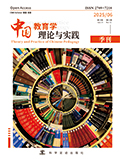

在近代中国教育史的发展历程中, 河南项城袁世凯家族作为影响深远的大家族之一, 其教育传统与近代转型具有重要的研究价值。在布迪厄“文化再生产”视角下, 本文通过梳理袁世凯家族“宏文重教”的家族传统, 如教育内容的严格督促、教学名师的积极延聘和教育目标的经世转化等内容, 揭示其教育基因的延续与近代转型的内在逻辑。袁世凯家族的教育基因主要体现为注重传统社会的道德浸润、强调子女兴趣特长的适时引导和重视族人言行举止的耳濡目染等。而袁氏家族的教育转型包括传统与现代的双重交织、实用主义的价值取向以及教育理念的现代转型。通过对袁世凯家族教育的深入研究, 旨在为理解近代中国家族教育的转型提供新的视角和思考, 如注 重家庭教育与社会变迁的互动、主动适应教育场域新规则等。
In the development of modern Chinese educational history, the Yuan Shikai family of Xiang Cheng, Henan Province, stands out as a historically influential lineage whose educational tradition and transformation hold significant research value. From Pierre Bourdieu' s perspective of “Cultural reproduction”, this paper examines the Yuan family’s tradition of valuing education———such as strict oversight of learning content, recruitment of renowned teachers, and the evolution of educational goals———to reveal the internal logic behind the continuity and transformation of its educational values. The Yuan’s family educational values are reflected in their emphasis on moral cultivation rooted in traditional society, timely guidance of children' s interests and talents, and behavioral modelling within clan' s. Their educational transformation featured a blending of tradition and modernity, a pragmatic orientation, and a shift toward modern educational concepts. By exploring the Yuan family’s approach to education, this study offers new insights into the transformation of family education in modern China, such as the interplay between family upbringing and societal changes, and the proactive adaptation to the new educational norms.